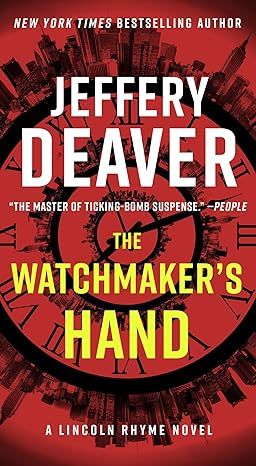The Watchmaker's Hand (Lincoln Rhyme Novel)
4.5
-
5,586 ratings
The "most clever plotter on the planet"(Publishers Weekly) Jeffery Deaver returns in this twisty new thriller, as forensic criminalist Lincoln Rhyme and detective Amelia Sachs track a criminal with a bizarre and catastrophic m.o.—toppling the construction cranes in New York City.
When a New York City construction crane mysteriously collapses, causing mass destruction and injury, Rhyme and Sachs are on the case. A political group claims responsibility for the sabotage and threatens another attack in twenty-four hours, unless its demands are met. The clock is ticking. Then a clue reveals to Rhyme that his nemesis, known as the Watchmaker, has come to town to fulfill his promise of murdering the criminalist. Now Rhyme and Sachs have to dodge his brilliant scheme to destroy them both, while racing against time to stop the construction site terrorists. With New York in a panic, Rhyme and his team must unravel a handful of plots as tightly wound as a timepiece—before more cranes fall, raining down death and destruction from above.
Kindle
$14.99
Available instantly
Audiobook
$0.00
with membership trial
Hardcover
$15.09
Paperback
$10.99
Ships from
Amazon.com
Payment
Secure transaction
ISBN-10
0593422139
ISBN-13
978-0593422137
Print length
528 pages
Language
English
Publisher
G.P. Putnam's Sons
Publication date
October 21, 2024
Dimensions
4.13 x 1.06 x 7.5 inches
Item weight
9.8 ounces
Product details
ASIN :
B0BX5HRYB3
File size :
3190 KB
Text-to-speech :
Enabled
Screen reader :
Supported
Enhanced typesetting :
Enabled
X-Ray :
Enabled
Word wise :
Enabled
Editorial Reviews
AN INSTANT USA TODAY BESTSELLER
A CBS New York Book Club Top 3 FicPick
"One would be hard-pressed to name a better writer of beat-the-clock thrillers than Jeffery Deaver. . . . The Watchmaker’s Hand, his latest novel featuring the quadriplegic New York City criminalist Lincoln Rhyme, turns urban strife into a tense tick-tock narrative. . . . Mr. Deaver’s book is an ingenious mechanism, designed to make the risks seem ever more real even as it increases the velocity of the pages being turned." —The Wall Street Journal
"The Rhyme novels are remarkably consistent: the writing is superb, the characters intriguing, the stories spellbinding, and the plot twists shocking. Fans of Deaver's long-running series will want to read this one as soon as they can. Expect high demand." —Booklist
"The Watchmaker’s Hand is engineered with typical Deaver precision. The plot barrels along with numerous unexpected twists and turns. I loved it!" —Kathy Reichs, author of the Temperance Brennan Bones series.
"Jeffery Deaver is a master storyteller. His characters and plotting are second to none. One of the true giants of the genre." —Steve Cavanagh, author of Thirteen
"Deaver masterfully delivers another pulse-pounding Lincoln Rhyme thriller that takes you on a frenzied ride through a New York City teetering on the edge of chaos. Deaver's exquisite plotting and meticulous research shine, constructing a web of political intrigue that ensnares Rhyme in a deadly race against time. The shadowy Watchmaker adds a layer of psychological dread. . . . This is a high-octane, nail-biter of a read that solidifies Deaver's standing as the virtuoso of the modern crime thriller." —Mark Dawson, author of The Cleaner
Read more
Sample
His gaze over the majestic panorama of Manhattan, 218 feet below, was interrupted by the alarm.
He had never before heard the urgent electronic pulsing on the job.
He was familiar with the sound from training, while getting his Fall Protection Certificate, but never on shift. His level of skill and the sophistication of the million-dollar contraption beneath him were such that there had never been a reason for the high-pitched sound to fill the cab in which he sat.
Scanning the ten-by-eight-inch monitors in front of him . . . yes, a red light was now flashing.
But at the same time, apart from the urgency of the electronics, Garry Helprin knew that this was a mistake. A sensor problem.
And, yes, seconds later the light went away. The sound went away.
He nudged the control to raise the eighteen-ton load aloft, and his thoughts returned to where they had been just a moment ago.
The baby's name. While his father hoped for William, and his wife's mother for Natalia, neither of those was going to happen. Perfectly fine names. But not for Peggy and him, not for their son or daughter. He'd suggested they have some fun with their parents. What they'd decided at last: Kierkegaard if a boy. Bashilda if a girl.
When she first told him these, Garry had said, "Bathsheba, you mean. From the Bible."
"No. Bashilda. My imaginary pony when I was ten."
Kierkegaard and Bashilda, they would tell the parents, and then move on to another topic-quickly. What a reaction they'd-
The alarm began to blare again, the light to flash. They were joined by another excited box on the monitor: the load moment indicator. The needle was tilting to the left above the words: Moment Imbalance.
Impossible.
The computer had calculated the weight of the jib in front of him-extending the length of a Boeing 777-and the weight on the jib behind. It then factored into the balance game the weight of the load in front and the weight of the concrete counterweights behind. Finally, it measured their distance from the center, where he sat in the cab of the crane.
"Come on, Big Blue. Really?"
Garry tended to talk to the machines he was operating. Some seemed to respond. This particular Baylor HT-4200 was the most talkative of them all.
Today, though, she was silent, other than the warning sound.
If the alarm was blaring for him, it was blaring in the supervisor's trailer too.
The radio clattered, and he heard in his headset: "Garry, what?"
He replied into the stalk mike, "Gotta be an LMI sensor problem. If there was moment five minutes ago, there's moment now. Nothing's changed."
"Wind?"
"None. Sensor, I'm . . ." He fell silent.
Feeling the tilt.
"Hell," he said quickly. "It is a moment fault. Forward jib is point three nine degrees down. Wait, now point four."
Was the load creeping toward the end of the blue latticed jib on its own? Had the trolley become detached from the drive cables?
Garry had never heard of that happening.
He looked forward. Saw nothing irregular.
Now: -.5
Nothing is more regulated and inspected on a construction site than the stability of a tower crane, especially one that soars this high into the sky and has within its perimeter a half-dozen structures-and hundreds, perhaps thousands, of human souls. Meticulous calculations are made of the load-in this case, 36,000 pounds of six-by-four-inch flange beams-and the counterweights, the rectangular blocks of cement, to make sure this particular crane can lift and swing the payload. Once that's signed off on, the info goes into the computer and the magic balance is maintained-moving the counterweights behind him back and forth ever so slightly to keep the needle at zero.
Moment . . .
-.51
He looked back at the counterweights. This was instinctive; he didn't know what he might see.
Nothing was visible.
-.52
The blaring continued.
-.54
He shut the alarm switch off. The accompanying indicator flashed Warning and the Moment Imbalance messages continued.
-.55
The super said, "We've hit diagnostics and don't see a sensor issue."
"Forget sensors," Garry said. "We're tilting."
-.58
"I'm going to manual." He shut off the controller. He'd been riding tower cranes for the past fifteen years, since he signed up with Moynahan Construction, after his stint as an engineer in the army. Digital controls made the job easier and safer, but he'd cut his teeth operating towers by hand, using charts and graphs and a pad attached to his thigh for calculations-and, of course, a needle balance indicator to get the moment just right. He now tugged on the joystick to draw the load trolley closer to center.
Then, switching to the counterweight control, he moved those away from the tower.
His eyes were fixed on the LMI, which still indicated moment imbalance forward.
He moved the weights, totaling a hundred tons, farther back.
This had to achieve moment.
It was impossible for it not to.
But it did not.
Back to the front jib.
He cranked the trolley closer to him. The flanges swung. He'd moved more quickly than he'd meant to.
He was looking at his coffee cup.
The chair-padded, comfortable-did not come factory-equipped with a cup holder. But Garry, an afficionado of any and all brews, had mounted one on the wall-far away from the electronics, of course.
The brown liquid was level; the cup was not.
Another glance at the LMI indicator.
A full -2 percent down in the front.
He worked the trolley control and brought the load of flanges closer yet.
Ah, yes, that did it.
The alarm light went out as the balance indicator now moved slowly back to -.5 and then 0, then 1, and kept rising. This was because the counterweights were so far back. Garry now reeled them in until they were as far forward as they could go.
It brought the LMI needle to 1.2.
This was normal. Cranes are made to lean backward slightly when there is no weight of a load on the front jib, which should, at rest, be about one degree. The main stability comes from the massive concrete base-that's what holds it upright when there's no balancing act going on.
"Got it, Danny," he radioed. "Stable. But I'll need maintenance. Got to be some counterweight issue."
"K. I think Will's off break."
Garry sat back and sipped his coffee, replaced the cup, listened to the wind. It would be some minutes before the mechanic arrived. To get to the cab from the ground, there was one way and one way only.
You climbed the mast.
But the cab was twenty-two stories above the ground. Which meant at least one, maybe two five-minute rest stops on the way up.
Guys on the site sometimes thought if you were a crane operator you were in lousy shape, sitting on your ass all day long. They forgot about the climb.
With no load to deliver, no hook block to steer carefully to the ground, he could sit back and enjoy the indescribable view. If Garry wanted, he could put a name to what he was looking at: the five boroughs of the city, a huge parcel of New Jersey, a thin band of Westchester, one of Long Island too.
But he wasn't interested in GPS information.
He was thrilled by the browns and grays and greens and white clouds and the endless blue-every shade far richer and bolder than when viewed by landlocked pedestrians below.
From a young age, Garry had known he wanted to build skyscrapers. That's what he had made with his Legos. That's what he had begged his parents to take him to visit, even when his mother and father blanched at the idea of standing on observation decks. He only liked the open ones. "You know," his father had said, "sometimes people go crazy and throw themselves off the edge of high places. The fear takes them."
Naw, probably not. There was nothing to fear from heights. The higher he got, the calmer he became. Whether it was rock climbing, mountaineering, or building skyscrapers, heights comforted him.
He was, he told Peggy, "in heaven" when he was far, far aboveground.
Back to baby names.
Kierkegaard, Bashilda . . .
What would they really pick? Neither wanted a Junior. And they didn't want any names currently in vogue, which you could find easily in the tiny booklets on the Gristedes checkout lane.
He reached for his coffee cup.
No!
The level had changed again. The front jib was dipping once more.
-.4
A moment later, the duo of warning signs burst on again, and the alarm, which had defaulted back on, blared.
The balance indicator jumped to -1.2.
He hit Transmit. "Dan. She's moving again. Big-time."
"Shit. What's going on?"
"Can't reel the load any farther. I'm dropping it. Clear the zone. Tell me when."
"Yeah, okay."
He couldn't hear the command from here, but he had a view through the Plexiglas straight down between his legs and saw the workers scatter quickly as the ground foreman told them to get out of the way.
Of course, "dropping" the load didn't mean that literally-yanking the release and letting the seventeen tons of steel free-fall to the ground. He eased the down lever and the bundle dropped fast. He could see, on his indicators and visually through the Plexiglas, exactly where it was on descent. At about thirty feet above the ground, he braked, and the bundle settled onto the concrete. Maybe some damage.
Too bad.
He adjusted the counterweights, hit the hook release and detached the load.
But this had no effect.
The word "impossible" came to his mind yet again.
He cranked the counterweights backward once more.
This had to arrest the forward tilt.
No load and the counterweights were at the far end of the back jib.
And still . . .
"Dan," he radioed, "we're five degrees down, forward jib. Counterweights're back."
-6.1
A crane is not meant to lean more than five degrees. Beyond that, the complicated skeletons of steel tubes and rods and plates begin to buckle and bend. The slewing plate-the huge turntable that swung the jib horizontally-was groaning.
He heard a distant but loud crack. Then another.
-7
Into the radio: "I'm losing it, Dan. Hit the siren."
Just moments later came the piercing emergency cry. This was not associated with a crane disaster specifically. It just meant some bad shit was going to happen. Instructions would be coming from the loudspeaker and on the radio.
"Garry, get out. Down the mast."
"In a minute . . ."
If Big Blue was going down, he was going to make sure she landed with as few injuries to those on the ground as possible.
He scanned the surroundings. There were buildings almost everywhere.
But fifty feet to the right of the jib was a gap between the office building in front of him and an apartment complex. Through the gap, he could see a street and a park. On this temperate day, there would be people outside, but they had most likely heard the siren and would be looking toward the akilter crane.
Cars and trucks, with windows rolled up?
"I'm aiming away from the buildings. Have somebody clear that park on Eighty-Ninth. And get a flagman into the street, stop traffic."
"Garry, get outta there while you can!"
"The park! Clear it!"
Creaking, groaning, the wind . . .
Another explosive snap.
He operated the swivel control and the slewing plate cried from binding against the bearings. The electric motor was laboring. Then, slowly, the jib responded.
"Come on, come on . . ."
Thirty feet from the gap.
Any minute now. He could feel it. Any minute she was going to drop.
Cars continued to stream past.
His decision was logical, but nonetheless stabbed his heart.
People were about to die because of him. Maybe fewer than if he didn't move the jib, but still . . .
The numbers rolled through his frantic mind.
Distance to the gap: twenty feet.
LMI: -8.2
"Come on," he whispered.
"Garry . . ."
"Clear the goddamn park! The street!" He tore the headset off as if the distraction of transmissions was gumming the mechanism further.
Twelve feet from the gap, nine degrees down.
The joystick was all the way to the right and the jib should have been swinging madly. But the binding metal of the slewing plate had slowed it to a crawl.
Slowed, but not stopped.
A sudden squeal. Nails on a chalkboard . . .
He jammed his teeth together at the sound.
Ten feet, ten degrees down.
Eight feet from the gap.
Please . . . A little farther . . .
Close. But if Big Blue failed now, the jib would slice through four or five floors of offices, all open design, hundreds of workers at desks and in cubicles, at coffee stations, in conference rooms. He could see them. A few were on their feet, staring at the tilting mast. No one was running. They were taking videos. Jesus . . .
Seven feet.
The motion stalled momentarily, then resumed, with the squeal and grinding even louder.
He nudged the stick to the left and it responded, swinging back a foot or two, then he shoved it to the right. The plate resumed its rotation in that direction, past the sticking point.
Six feet from the gap, down twelve degrees . . .
Crack . . .
The loud sound from behind made him jump.
What was it?
Ah, of course.
The exit door in the floor that led down to the mast, to the ladder, to safety, had buckled. He climbed from his seat briefly and tugged. Useless.
There was only one other exit-above him. But that gave no access to the mast.
Forget it now. Just get another five feet and she'll be clear.
The jib was still tilting down, but the LMI indicator had stopped at -13. The engineers, of course, had known that there was no point in going farther. A jib would never tilt that far forward.
Six feet away from the lifesaving gap, the mast suddenly pitched forward a few feet. Garry slipped from the seat and fell. He landed face-first on the bulb of the window. From here, he found himself looking straight downward, twenty-two stories, to the jobsite. He inhaled and exhaled deeply, leaving a design of condensation on the glass in front of him. It was, curiously, almost in the shape of a heart.
He thought of his wife.
And of their child, soon to be born.
Kierkegaard or Bashilda . . .
Read more
About the authors
Jeffery Deaver
Jeffery Deaver is an international number-one bestselling author. His novels have appeared on bestseller lists around the world. His books are sold in 150 countries and translated into over twenty-five languages. He has served two terms as president of Mystery Writers of America, and was recently named a Grand Master of MWA, whose ranks include Agatha Christie, Ellery Queen, Mary Higgins Clark and Walter Mosely.
The author of over forty novels, three collections of short stories and a nonfiction law book, and a lyricist of a country-western album, he’s received or been shortlisted for dozens of awards. His "The Bodies Left Behind" was named Novel of the Year by the International Thriller Writers association, and his Lincoln Rhyme thriller "The Broken Window" and a stand-alone, "Edge," were also nominated for that prize. "The Garden of Beasts" won the Steel Dagger from the Crime Writers Association in England. He’s also been nominated for eight Edgar Awards by the MWA.
Deaver has been honored with the Lifetime Achievement Award by the Bouchercon World Mystery Convention, the Strand Magazine’s Lifetime Achievement Award and the Raymond Chandler Lifetime Achievement Award in Italy.
His book "A Maiden’s Grave" was made into an HBO movie starring James Garner and Marlee Matlin, and his novel "The Bone Collector" was a feature release from Universal Pictures, starring Denzel Washington and Angelina Jolie. Lifetime aired an adaptation of his "The Devil’s Teardrop." NBC television recently aired the nine-episode prime-time series, "Lincoln Rhyme: Hunt for the Bone Collector."
You can find out more about Jeffery on his website www.jefferydeaver.com, Facebook page facebook.com/JefferyDeaver, and follow him on Twitter @JefferyDeaver.
Read more
Reviews
Customer reviews
4.5 out of 5
5,586 global ratings
Mary Rogers
5
One of Deaver’s Best
Reviewed in the United States on May 25, 2024
Verified Purchase
Loved all the “diversions”. Kept me guessing. Love this Rhyme drama and love to read Jeffery Deaver books. I like books that hold my attention to the end.
CPW
5
Good next book in the series.
Reviewed in the United States on April 27, 2024
Verified Purchase
Jeffery Deaver continues the story of Lincoln Rhyme. Easy read. Good story.
Richard B. Schwartz
5
A Christmas Present For All His Readers
Reviewed in the United States on December 9, 2023
Verified Purchase
Jeff Deaver’s new novel carries a jacket blurb from PEOPLE magazine: “The Master of Ticking-Bomb Suspense.” Deaver is doing many things but he handles the ticking-time-bomb business sparingly and deliberately. He is actually the master of two things. The first is end-of-the-novel reversals (and they are usually plentiful). The second is ‘information.’ One of the things that crime fiction readers enjoy is learning things about obscure, fascinating subjects. This probably goes back to the puzzle novels of the first generation/golden age crime writers. The subject is now far advanced. Michael Connelly tells us all about courtroom techniques and he studies the city of the Angels street by street, alleyway by alleyway. Jeff Deaver studies everything. He knows NYC intimately, but also the chemical components of the grit in its highways and byways. He knows communication systems and information technology and ordnance and chemistry and…well, just about everything.
In his new novel he is up against his classic villain, termed the ‘Watchmaker’ (and, yes, JD knows timepieces and time theory). That bad boy is bringing down construction cranes using exotic acid devices and they can do a lot of damage, particularly when they’re falling on things like hospitals (hospitals with rooms filled with chemicals and gases that can do beaucoup harm to the patients, docs and nurses).
But is this all a diversion? I won’t offer any SPOILERS, but I will say that the nature of the reversals associated with JD’s third acts have changed in THE WATCHMAKER’S HAND. As usual, all of the boxes are ticked: fascinating characters, fully-realized setting, masterful plotting, and delicious gobs of information on interesting subjects. If there is a criticism it would be that everything is very, very complicated at the end and there may be too much to plow through for the average reader.
Anyway, it’s good to be back in town with Lincoln Rhyme, his wife and his team. Five stars.
Thanks to JD for a nice Christmas present for all of us.
Read more
4 people found this helpful
Leslie Bialler
5
Complications upon complications . . .
Reviewed in the United States on December 11, 2023
Verified Purchase
Deaver’s latest brings welcomes back Charles Vespasian Hale, aka “The Watchmaker.” He has returned to New York with the intention, among much else, to terminate Lincoln Rhyme with extreme prejudice. This allows Deaver to pull out all of those proverbial stops and provide us with surprise after surprise, and surprises that end up not being surprises.
Early in the book Hale talks of watch complications. I.e., a standard-issue watch that tells you only the time is simple (and Hale at one point says your beloved old quartz watch actually keeps slightly more accurate time than the finest Swiss mechanical masterpieces). Add a date window, you have one complication. Add more, and you have more complications.
Just like this book.
With crashing construction cranes (there’s a terrific scene set in a hospital that has a date with one), crooked cops, a co-conspirator, and the usual cast (including a family of falcons), it’s very suspenseful, and fun to read in its noir way. By now you know if you like Rhyme or not, and if you do, here’s one more. Deaver still does this better than anyone else, and if this one has shimmers of self-parody about it, maybe that’s just another nudge nudge wink wink from the master.
We’ll find out soon enough: toward the end (duh, where else would it be?} a setup for the next book sneaks in among the tied-up loose ends.
Notes and asides:
. There really are falcons in New York. As the author says they do not hang out on low places. They prefer church steeples, bridge towers, and the Chrysler Building.
. Deaver fans who visit Manhattan in hopes of finding those streets in the village named here will be disappointed. On the other hand, E 89th Street is certainly real enough.
. Stay away from Hydrofluoric acid.
Read more
3 people found this helpful
Cheryl yoshimori
5
Great Read!
Reviewed in the United States on May 6, 2024
Verified Purchase
I always love his Lincoln Rhyme novels-fast moving and always keep me guessing.
Top Jeffery Deaver titles
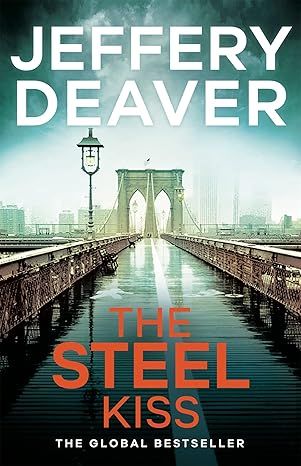
The Steel Kiss: Lincoln Rhyme Book 12 (Lincoln Rhyme Thrillers)
4.3
-
15,078
$2.55
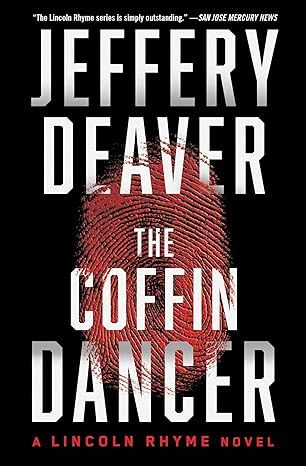
The Coffin Dancer: A Novel (2) (Lincoln Rhyme Novel)
4.5
-
5,617
$1.31

Cause of Death
4.2
-
5,166
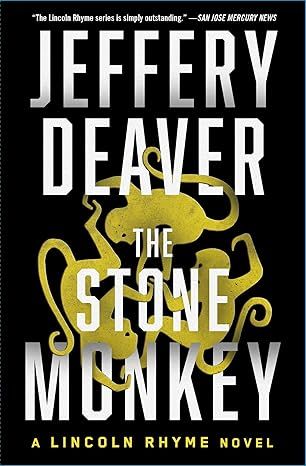
The Stone Monkey: A Lincoln Rhyme Novel (4)
4.5
-
4,802
$1.24
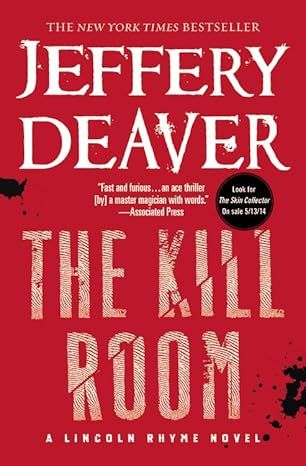
The Kill Room (Lincoln Rhyme)
4.3
-
6,193
$5.29
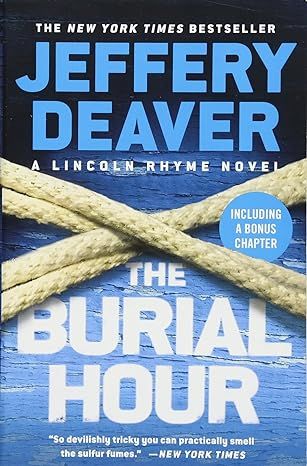
The Burial Hour (A Lincoln Rhyme Novel, 14)
4.2
-
12,268
$9.99
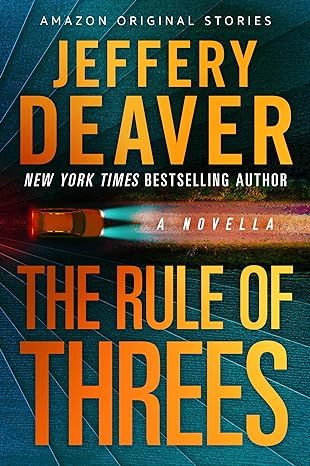
The Rule of Threes: A Novella
4
-
10,459
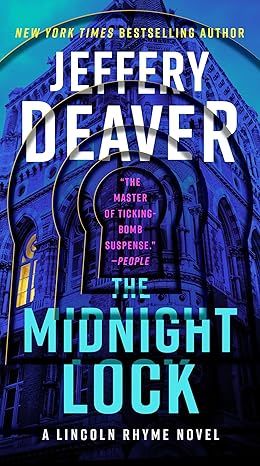
The Midnight Lock (Lincoln Rhyme Novel)
4.5
-
10,344
$2.05
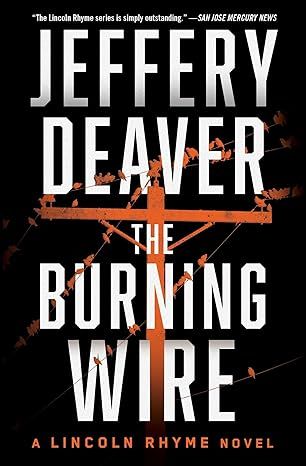
The Burning Wire (9) (Lincoln Rhyme Novel)
4.4
-
5,500
$3.99
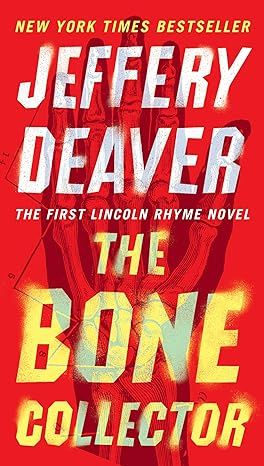
The Bone Collector (Lincoln Rhyme Novel)
4.5
-
7,183
$7.99

The Pain Hunter (The Broken Doll Book 1)
4.2
-
5,263

Shallow Graves
4
-
1,304
$3.82
Best Sellers

The Tuscan Child
4.2
-
100,022
$8.39

The Thursday Murder Club: A Novel (A Thursday Murder Club Mystery)
4.3
-
155,575
$6.33

Sapiens: A Brief History of Humankind
4.6
-
140,302
$13.49

The Butterfly Garden (The Collector, 1)
4.3
-
88,556
$9.59

Things We Hide from the Light (Knockemout Series, 2)
4.4
-
94,890
$11.66

The Last Thing He Told Me: A Novel
4.3
-
154,085
$2.99

The Perfect Marriage: A Completely Gripping Psychological Suspense
4.3
-
143,196
$9.47

The Coworker
4.1
-
80,003
$13.48

First Lie Wins: A Novel (Random House Large Print)
4.3
-
54,062
$14.99

Mile High (Windy City Series Book 1)
4.4
-
59,745
$16.19

Layla
4.2
-
107,613
$8.99

The Locked Door
4.4
-
94,673
$8.53
